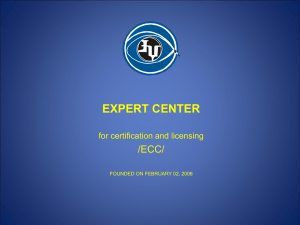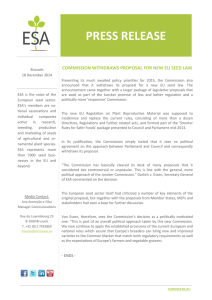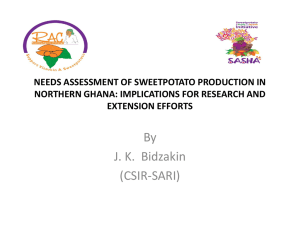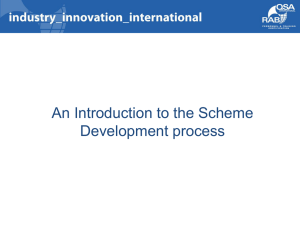Potato Science – Lecture 9 nolte 014
advertisement
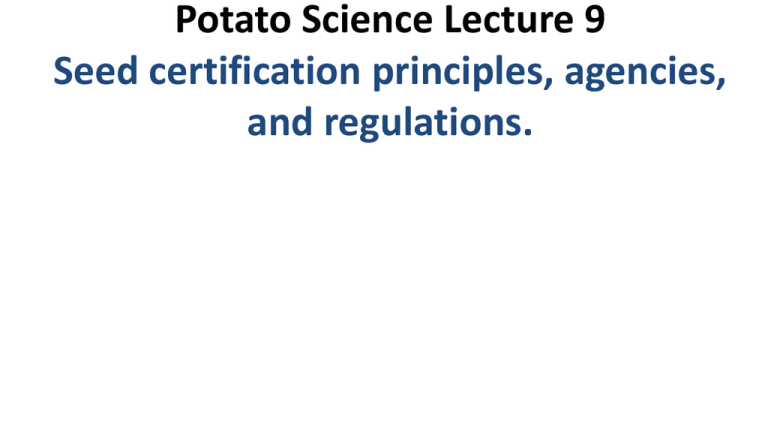
Potato Science Lecture 9 Seed certification principles, agencies, and regulations. Potato Science Lecture 7 Seed certification principles, agencies, and regulations. Seed Certification Purpose and principles Agencies Regulations History of Certification 1900 - Dutch and Germans recognized chronic diseases and initiated roguing . 1912 - U.S. Quarantine Act passed 1913 to 1922 - Certification agencies organized in 22 states Purpose of Certification “…to maintain and make available to the public high quality seeds of superior crop varieties so grown and distributed as to preserve genetic identity and purity.” ICIA Rules of Certification NOTE! “Certification” is NOT a guarantee that no problems will occur. It indicates that the crop has met the rules of the certification agency. XII. Disclaimer Representation and Limitation of Remedy and Liability A. Since the use of certified seed potatoes is beyond the control of the grower, the seller, the inspector, the Idaho Federal-State Inspection Service and the Idaho Crop Improvement Association, Inc. Make NO representation of any kind, expressed or implied, including merchantability, fitness for a particular purpose, quality or freedom from disease, is made concerning certified seed potatoes which extends beyond the description set forth. Certified Seed Potatoes Not a Guarantee, but… Produced under strict guidelines Many inspections Not commercial production Seed is more expensive to produce Seed is more risky “Limited Generation” Lab derived, disease-free stocks Increased a “limited” # of years G6 last generation allowed (ID) Most is G3 with G2 < and G4> Inspections 2 summer field inspections Storage inspections Winter grow-out in CA Shipping point inspections Why Inspect ? Disease (virus, BRR, others) Variety mixes Herbicide damage/carryover Seed lot identity Other? The Idaho Crop Improvement Association, Inc. inspector and Idaho Federal-State inspector are given authority to refuse to tag and seal any seed potatoes for any condition or situation that may bring certification into disfavor or make an accurate inspection impossible. IDAHO CROP IMPROVEMENT ASSOCIATION, INC. RULES OF CERTIFICATION for SEED POTATOES IN IDAHO PART I - GENERAL INFORMATION http://www.idahocrop.com/StandardDocs/97Potato-R&R07.pdf Certification Procedures Considered to be a voluntary program (majority consent) Each state agency published regulations approved by grower advisory committees Certification is issued for potato lots that meet regulations Certification Procedures Certification based on a series of inspections Certification can be withheld only upon failure to meet regulations Most states now use a limited generation program Certification Agencies State agencies are independent May be sponsored by grower groups, agriculture departments, universities, or other organizations Regulations, terminology, and tolerances differ by state Certification Terms Certification - attaching of the official certification tag Certified seed - potatoes that have met Idaho Rules of Certification and met grade requirements Generation - a classification scheme based on years of field production Certification Terms Limited-generation seed - seed originating from a pathogen free source and grown for a maximum number of years (7) in the field Seed lot - seed potatoes from a field(s) entered for certification on a single application Certification Terms Disqualification - removal of eligibility for certification status Downgrading - changing generation status due to failure to meet tolerances Recertifying – registering and growing for another season in the seed program Roguing - removal or destruction of diseased or undesirable plants from a lot Certification Terms Tolerance - maximum amount of a certification factor allowed Zero tolerance factor - none of the factor allowed in a seed lot (ring rot, RK nematode, CRS) Shipping point inspection - inspection of tubers after grading but prior to shipping Tolerances have been established for : Potato Virus Y Potato Leaf Roll “PLRV” Potato Leaf Roll “Net necrosis” PVY Tuber necrotic ringspot “PTNRD” Zero tolerance disease : Bacterial Ring Rot “BRR” Variable? tolerance disease : Bacterial Soft Rot/ Blackleg Disease of note: Potato late blight Certification Procedures Identity preserved lot entered by grower Five inspections conducted Two summer field inspections storage inspection winter test inspection shipping point inspection Certification tag attached Certification Procedures Eligibility Seed farm eligibility all seed entered Seed stock eligibility limited generation clause previous certification no BRR on production farm out-of-state seed meet state tolerances Certification Procedures First Field Inspection Land Requirements No RK nematode, CRS, Rhizomania No uncert potatoes or BRR year before Isolation Requirements 20 feet from uncertified 6 feet from other certified Certification Procedures First Field Inspection Meet field tolerances for Varietal mix PVY and mosaic Leafroll Blackleg Total virus Samples taken for PVX tests Certification Procedures Second Field Inspection Meet field tolerances for Varietal mix PVY and mosaic Leafroll Blackleg Total virus Certification Procedures Storage Inspection Eligibility maintenance Absence of sprout inhibitors Absence of other problem potatoes Lot identity maintained Lot separation Certification Procedures Winter Test Inspection California Winter Test ELISA testing Seed Seminar Program Report: 2013 Winter Test Update 21 January, 2014 Certification Procedures Shipping Point Inspection Grade tolerances for rot, size, freezing injury, scab, defects, mechanical injury, varietal purity, and foreign material Blue Tag - 10% defects, 3% freezing injury, 1% rot Also Green Tag, Yellow Tag XI. Grade Requirements A. Idaho Certified Blue Tag Seed Potatoes The blue tag shall be equivalent to U.S. No. 1 seed potato grade with the following exceptions. There is a 1% tolerance for late blight. 1. Scab - shall not cover more than one-fifth of the surface area. 2. Adhering dirt - a maximum of 50% of the tuber surface may be covered with caked dirt. 3. Loose dirt and/or foreign material - included in total external tolerance. 4. Clipping or trimming not allowed. 5. Freshly broken off second growth - shall not be damaged. 6. Wireworm - damaged by waste. 7. Tolerances: For total defects 10%. Three percent (3%) for potatoes The blue tag shall be equivalent to U.S. No. 1 seed potato grade with the following exceptions. B. Idaho Certified Green Tag Seed Potatoes The green tag grade shall be equivalent to the U.S. No. 2 grade with the following exceptions. There is a 1% tolerance for late blight. 1. Size - 1 3/8 inches minimum C. Idaho Certified Yellow Tag Seed Potatoes The yellow tag grade shall be equivalent to the U.S. No. 2 grade with the following exceptions. There is a 1% tolerance for late blight. 1. Size - 12 ounces maximum - no minimum size, unless otherwise specified. Theory Practice Seed Certification is: A system that provides quality seed That will perform for the producer Minimal risk – but nothing’s perfect Achievable by seed producers Process is dynamic Rules can be changed Seed Certification Costs Quality seed isn’t cheap! Currently costs 25.40 / acre Locked in for a few years Will need to be increased? When? How much more? Case History PVY in Idaho 1990-2011 PVY vs Certification in Idaho Solution arrived at by trial and error Recertification tolerances very low % Commercial seed = higher tolerances 1990 >5% PVY = rejection 1997 >10% = rejection 2000 >15% = rejection 2005 no rejection for virus Certification Procedures Winter Test Inspection California Winter Test ELISA testing Cert. Recert. Leafroll 2% 0.8% PVY 10% 2.0% ? Rationale Why eliminate tolerances on cert seed? Achievable by seed producers? Out-of-state seed meets ID tolerances? States don’t control each others rules This change leveled the playing field PVY vs Certification in Idaho The train wreck of 2007 2007 frost at winter test site Several lots certified with >50% PVY! Lots of negative fallout ICIA abandoned visual insp for PVY 100% of the crop is now ELISA tested Has this change been effective? PVY in Idaho seed 2007-2013 100 80 27 20 51 60 19 12 19 2007 2008 34 2009 Clean 13 21 37 25 50 54 2012 2013 50 61 20 0 8 40 60 40 16 52 31 2010 Infected 2011 Ineligible Current and Future Issues Idaho Certified Seed Law Non-certified seed can be used if: Only one year out of certification User must have grown crop himself User must have stored crop himself Must be winter tested for PLRV, PVY and BRR. Canada/US-Management Plan for Potato Viruses that Cause Tuber Necrosis This plan proposes immediate measures to manage the risks associated with several pests that occur in both countries, including Potato mop top virus (PMTV), Potato virus Y (PVY) complex and Tobacco rattle virus (TRV), through seed potato certification measures. Through surveys and research, data will be collected and evaluated to better understand the biology of these viruses and their vectors, thus enabling the establishment of further control measures. Certification Agencies State agencies are independent Rules different state to state Other countries = one unified system USA system confusing for them Causes problems with exports MOU?
